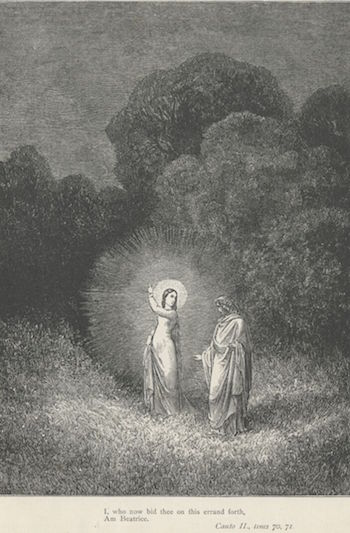Inferno, a poem written by Dante Alighieri, was one of the most revolutionary works of literature of it’s time for various reasons, such as it’s inclusion of women in its story. Dante mentions characters such as Beatrice, St. Lucia, and Francesca. In Inferno, Beatrice was a woman in which Dante wrote most of his poetry and texts about. She was described as a beautiful lady who was a ‘true praise of god’ (Canto 2, line 103), a lady whose eyes were ‘shining brighter than the morning star’ (Canto 2, line 55-56) and was a ‘lady of power’ (Canto 2, line 76). St. Lucia, was a ‘guardian angel’ for Dante, as she was sent from Beatrice to warn Virgil to aid Dante in his travels. Lines 97-100 of Canto 2 state, “ She called Lucia in her request and said:– Now your faithful one has need of you, and I put him in your hands–”. Virgil is sent to help Dante as he later faces the gates of hell, and helps Dante overcome his fear of being a mortal entering hell. Francesca, one of the rulers of Ravenna, was sent to hell after her husband killed her for having an affair with her brother, Paolo. Despite this incident, Dante still describes Francesca “as a beautiful, gentle seductress” (Stuber, 2018). Dante describes many of the women in this text to be beautiful and full of power, as well as being to seduce others.
While analyzing the many cantos of Inferno, it’s clear that no matter the story, Dante always made sure that the stories of these women were heard and conveyed them with utmost importance. This was revolutionary for Dante’s time, because women often were excluded and put on the sidelines in literature, therefore the inclusion of women was a vital step in the enhancement of literature at the time. His inclusion of women was also revolutionary because this created a path for many poets in the future to also include women in their poetry. Along with that, throughout the text Inferno, women tend to have very important roles to the story. For example, Beatrice, being the love of Dante’s life, is the inspiration behind much of his poetry. She is shown as a powerful character in both La Vita Nuova and The Divine Comedy, as he carries her legacy after her death. She is also consistently brought up in these texts, giving the reader a clear remembrance of her and her importance to his writing. Saint Lucia, being Dante’s guardian angel, has another important role in The Divine Comedy. She helps guide Dante through the levels of hell by summoning Virgil to help Dante get over his cowardness.
Stuber, S. (2018, June 4). Reading Dante as a feminist. The Stanford Daily. Retrieved September 25, 2021, from https://www.stanforddaily.com/2018/06/04/reading-dante-as-a-feminist/.
Alighieri, Dante, Durling, Robert, Martinez, Robert, Turner, Robert. (1996, February 29). The Divine Comedy of Dante Alighieri: Inferno. Oxford University Press USA. Retrieved September 26, 2021, from https://ebookcentral.proquest.com/lib/ccny-ebooks/reader.action?docID=693941
Alighieri, D., Moser, B., & Alighieri, D. (1980). The divine comedy of Dante Alighieri ; Inferno. New York: Bantam Books.




